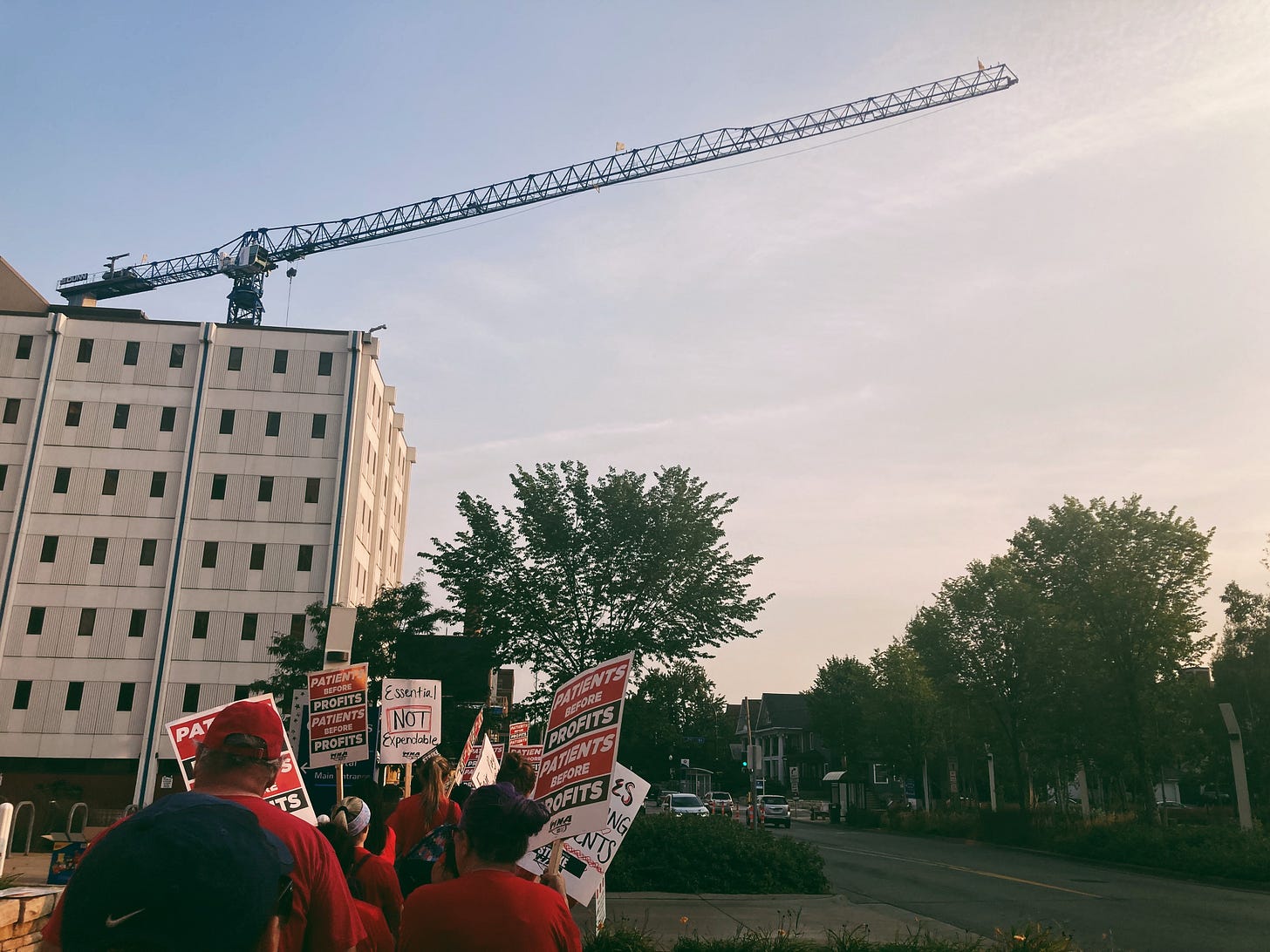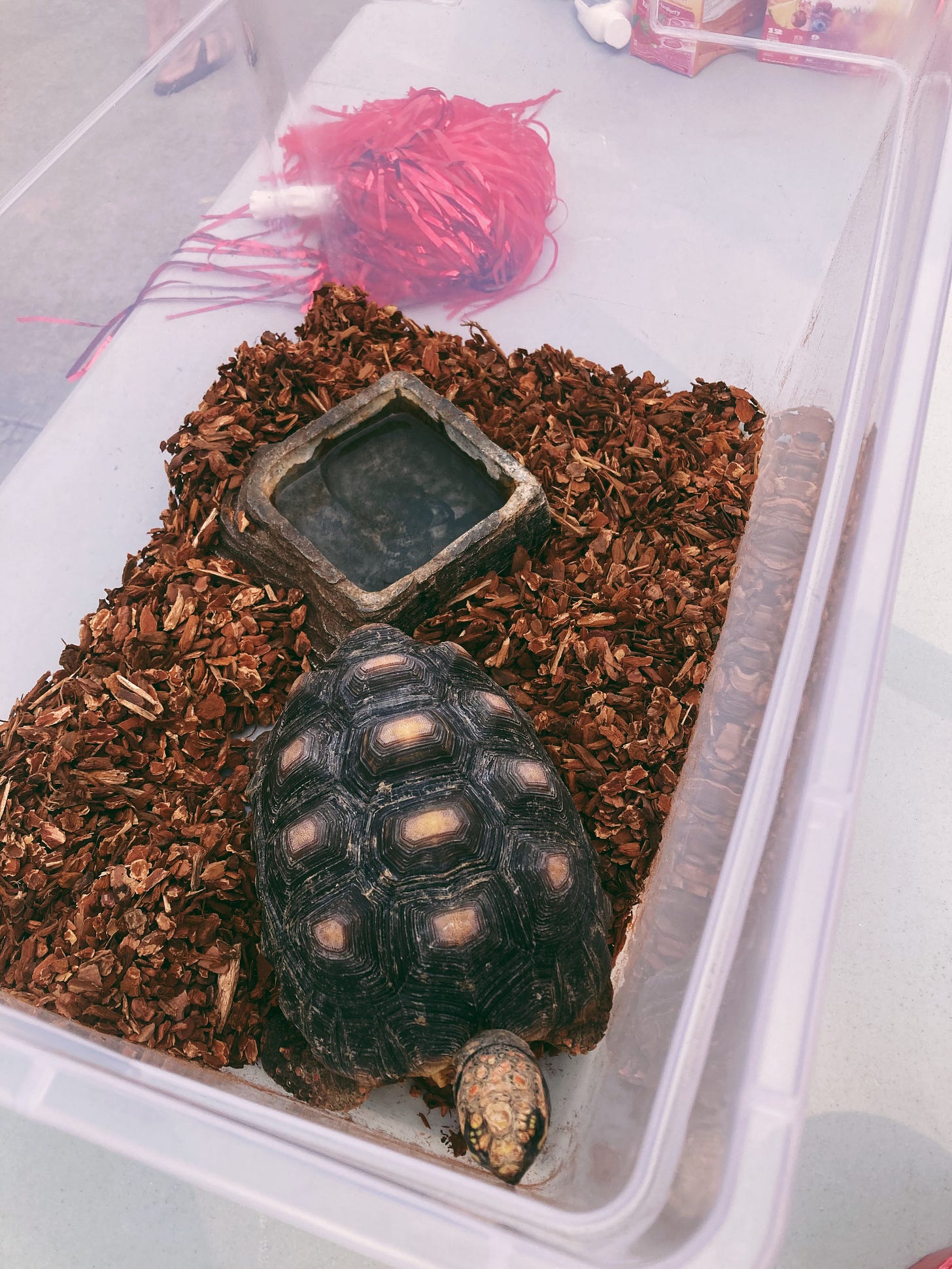An overview of the nurses’ strike
Called heroes, treated like zeroes. Striketember continues.
Hello, friends! Fall is in the air and so is worker power. Community members and leaders showed their support for 15,000 nurses with the Minnesota Nurses Association that went on strike across the Twin Cities and Duluth. They returned to work on Thursday and face more bargaining sessions in the next week.

🪧 A collection of media about the strike
The strike was heavily covered by the media. I’ve been gathering stories and have noticed a lot of different voices and perspectives. What do you notice about the way headlines are written and the way events and struggles are framed? First up is local news.
MPR’s Cathy Wurzer talked with Peter Rachleff, retired history professor at Macalester College and co-executive director at East Side Freedom Library: How the Minnesota nurses strike could have national implications.
There was also a ripple effect back in 2010: 12,000 Minnesota Nurses Stage One-Day Strike.
MPR’s Michelle Wiley at the beginning of the strike: No new talks planned as 3-day nurses strike starts in Twin Cities, Duluth.
Sahan Journal’s Drew Arrieta interviewed nurses of color: Nurses of color on a historic strike share why they’re fighting for increased staffing, higher wages, and better patient care.
FOX9’s Leah Beno interviewed Jill Ostrem, President of Allina Health’s United and Mercy hospitals, ahead of the strike: What to expect during Minnesota's possible nurses strike.
Independent journalist Georgia Fort interviewed Black nurses:
Black nurses demand better working conditions; No deal reached on second day of massive strike.
After the strike: The nurse strike is over. Now what?

Minnesota Reformer’s Max Nesterak provided details and context: Thousands of Minnesota nurses hit the picket lines in historic 3-day strike. In this piece with Maia Irvin there are stories from nurses and patients: 15,000 nurses launch historic 3-day strike at hospitals across Twin Cities, Duluth.
Axios Twin Cities’ Torey Van Oot provided details: 15,000 Minnesota nurses go on strike in Twin Cities, Duluth and Minnesota nurses return to work after three-day strike.
Star Tribune’s Jeremy Olson and Jana Hollingsworth reported: Nurses go on strike at Twin Cities, Duluth area hospitals.
WCCO’s Pauleen Lee on the scene:
🗞️ National news
Go behind the scenes with ABC’s Nightline and MNA’s First Vice President Chris Rubesch: Nurses in Minnesota organize largest strike of private-sector nurses in U.S. history.
NPR’s Steve Inskeep and A Martinez talked with Michelle Wiley for Up First (around 9:10): thousands of nurses go on strike for better working conditions.
Jacobin’s Tadhg Larabee interviewed Kelley Anaas, ICU nurse at Abbott Northwestern: One of the Largest Nurses’ Strikes in US History is Brewing in Minnesota…
“The ICU can rob people of their dignity. That’s been really hard to watch, because I work harder than I’ve ever worked in my life, and I leave work thinking that my best wasn’t good enough, that it could have been better for the patients if I had more resources to care for them.”
Jacobin published an opinion piece by Rep. Ilhan Omar: Minnesota Nurses Are Ready to Strike. I Stand With Them.
Truthout’s Sharon Zhang on Rep. Ilhan Omar’s visit to picket line: “Patients Over Profits”: Ilhan Omar Joins Thousands of Nurses in Picket Line.
In this House Committee on Education and Labor meeting on removing barriers in organizing that was held on Wednesday, Rep. Omar gave a shout out to the nurses:
“They certainly aren't the only workplace that is facing this unique and escalating concern due to the ongoing pandemic.”
AP News’ Trisha Ahmed and Gretchen Ehlke reported: Thousands of Minnesota nurses launch 3-day strike over pay.
Washington Post’s Lauren Kaori Gurley reported: Largest private-sector nurses strike in U.S. history begins in Minnesota.
“For years, hospitals in the United States have faced understaffing problems. A surge in demand and increased safety risks for nurses during the pandemic accelerated those trends. The number of health care workers in the United States has still not recovered to its pre-pandemic levels, down 37,000 workers compared with February 2020.”
🚂 Hop on the solidarity train
ICYMI: Another worker action that made headlines this week was the potential rail strike. Before announcing that the unions reached a tentative agreement, the Railroad Workers’ Union passed a resolution in support of the nurses! Their demands are strikingly similar: safe staffing and paid leave.
Nurses in Madison, WI, seeking union recognition with SEIU, were set to strike for 3 days as well, but reached an agreement after Governor Tony Evers intervened. So instead they decided to celebrate: Union backers celebrate deal to avoid UW Health nurses’ strike.
MN Governor Walz showed up to the nurses’ picket line, however he didn’t show up to the three-week long teachers’ strike last March.
Read a list about other healthcare worker actions here.
🏥 Why is staffing such a big deal?
It seems like staffing has always been a concern for nurses since before the COVID-19 pandemic.
Keeping Nurses at the Bedside Act would’ve addressed acute staffing shortages across the state, but the bill didn’t make it past the MN Senate.
Union Advocate’s Michael Moore earlier this year: As staffing crisis deepens, DFL lawmakers respond with bill to keep nurses at bedside.
Because this bill failed to move forward, nurses made staffing a key part of their negotiations.
❤️🩹 “Lost on the Frontline”: Why do nurses leave the bedside?
A 2022 report from the Minnesota Nurses Association that includes a survey of 748 former nurses addresses why they left the profession. The top reasons were management issues and short staffing.

A 2022 report from the Surgeon General calls for systemic change in our health system to address healthcare worker burnout. One of the pieces of advice for workers themselves? “Use your voice to advocate for positive changes in your workplace, learning environment or communities.”
Nurses in the U.S. Are Suffering “Moral Injury”
Lean Production in Health Care Is a Disaster for Workers and Patients Alike
‘It’s a war zone’: healthcare workers show signs of stress similar to combat veterans
12 Months of Trauma: More Than 3,600 US Health Workers Died in Covid’s First Year
Are there more voices, stories, articles, or videos we should include in this list? Let us know!
And please share and subscribe this newsletter with your network!
The seasons change, why can’t we? We are each other’s harvest.






